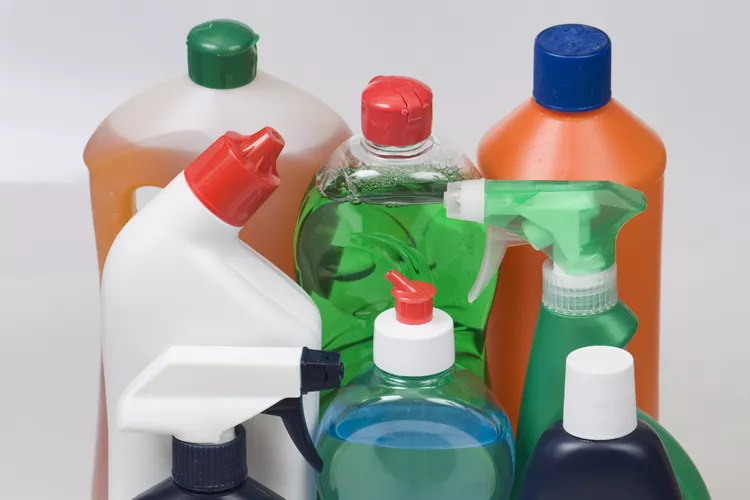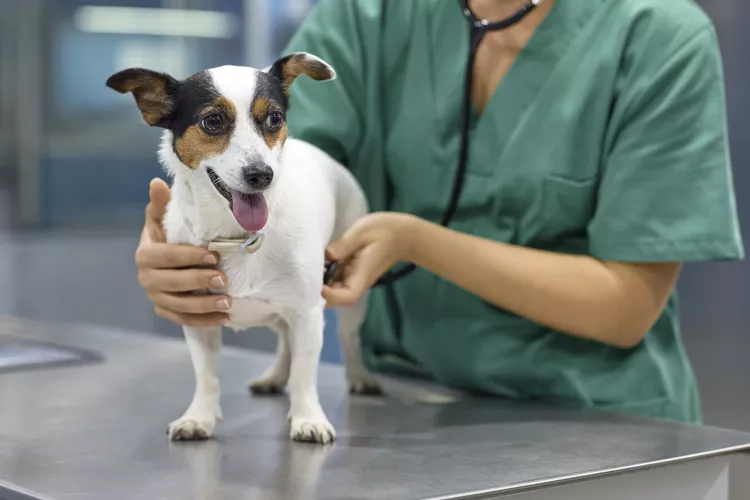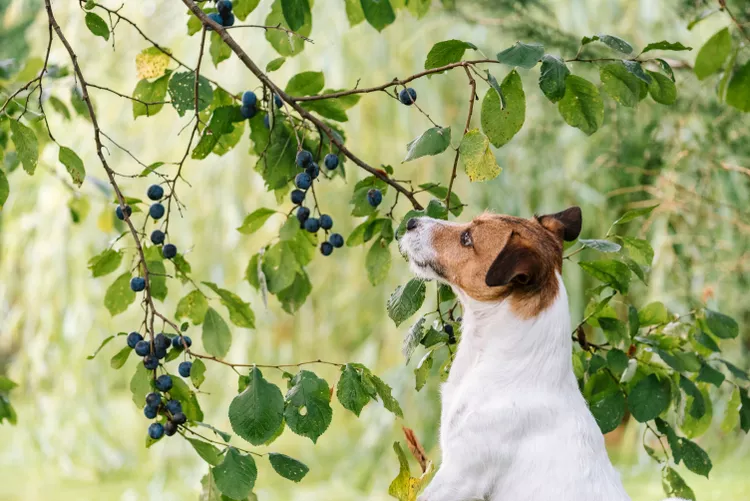
Found in smoothies, salads, and various health foods, kale is considered a superfood for humans, with benefits ranging from improving vision to even warding off cancer and other diseases. So it's no surprise that many pet owners wonder if it's safe to share some of these disease-fighting benefits with their favorite four-legged friend.
The problem with kale for dogs is that even though the health benefits for humans may be seemingly endless, the benefits for canines haven't been thoroughly investigated. The other issue is that kale contains certain natural compounds, including calcium oxalate and isothiocyanates, that can be harmful for dogs.
Calcium oxalate can lead to health issues including kidney and bladder stones. Dogs that are already prone to these issues should avoid kale and other foods that contain calcium oxalate, which include spinach, beet greens and roots of beets, collards, parsley, leeks, quinoa, okra, and Swiss chard. Although kidney and bladder stones are usually treatable, veterinary experts warn that it simply might not be worth the risk.
Found in both kale and broccoli, as well as a few other leafy greens, isothiocyanates are another natural compound associated with potential health risks for dogs. Interestingly enough, that same compound is believed to be something of a cancer fighter in humans. Isothiocyanates can cause gastric irritation in some dogs, ranging from mild to severe, and even be potentially fatal in large amounts.
Because both broccoli and kale contain similar levels of this compound, they are both only considered safe for dogs if the total amount ingested is less than 10 percent of their daily intake. If your dog consumed over 25 percent of their intake, that's when the kale may become potentially toxic. Keep in mind that 25 percent might not be all that much for a larger breed, but if you have a Shih Tzu or other small or toy breed at home, just a few kale stalks can be dangerous.
One other potential concern with kale is that it can negatively impact your dog's thyroid function if offered on a regular basis. Dogs who already have hypothyroidism can also suffer from medication interactions if they consume large amounts of kale on a regular basis.
As a result, occasionally offering your pooch small amounts of kale likely won't cause any damage, but some veterinarians may caution against using kale as a treat or regular component of a homemade diet, particularly if your pet already has certain underlying medical issues.
While the jury still seems to be out on exactly how much kale (and other similar veggies) can benefit our pets, we do know that kale is jam-packed with numerous vitamins and minerals, while being rich in fiber and low in calories. It's an excellent source of vitamins including A, K, and C, as well as nutrients such as iron, calcium, magnesium, copper, and potassium. Rich in beta-carotene, kale is often touted as having potential cancer-fighting properties as well as helping to boost vision and overall eye health.
Will your dog reap some of these benefits if you occasionally offer him kale? The answer is most likely yes. But because there are some potential risks associated with kale, pet owners should discuss whether the potential risks outweigh the benefits with their dog's veterinarian.
If you do opt to feed kale to your dog, be sure that it's thoroughly washed to remove any residual pesticides. It can be cooked or steamed without adding any seasonings, some of which can be harmful for dogs, and cut into bite-sized pieces to reduce the risk or choking and make the greens easier for your pooch to digest. Some pet owners even puree the kale before adding it to their dog's regular food for an extra nutrient boost.
While a small amount of kale is probably harmless, not all dogs will react the same way. And, of course, your dog's size will play a significant role in the kind of reaction he or she may have to a human food like kale.
Every dog is unique, and what irritates some dogs is safe to feed others. As always, be sure to check in with your veterinarian before offering kale, and monitor your dog closely after offering a small amount the first time to ensure that their digestive system can tolerate it.
If your dog manages to steal a significant amount of kale from your plate, the first thing to do is monitor him or her closely for any signs of intestinal upset, including vomiting or diarrhea, as well as potential signs of kidney or bladder stones, which may include difficulty urinating or other changes in their typical urination habits. If these symptoms are detected, you will need to alert your veterinarian immediately.

10 Obscure, Little-known Canine Facts in Honor of National Dog Day
With National Dog Day upon us, it's time to celebrate everything about our favorite pets—even the weirder stuff. Here are 10 obscure facts about dogs you probably didn't know.
Exploring the Different Types of Pet-Friendly Beaches
Are you looking for pet-friendly beaches? Learn about the different types of pet-friendly beaches, their locations, and tips for visiting them with your pet.
Toxic Chemicals & Household Items That Can Poison Dogs
There are many things in and around your home that can endanger your dog. Learn which chemicals and household items can poisin your dog.
Bronchitis in Dogs
Is your dog coughing and feeling unwell? It could be due to respiratory inflammation called bronchitis. Learn the causes, treatment, and prevention.
Choking in Dogs
A dog can occasionally swallow something incorrectly and start choking. Find out how you can tell if your dog is choking and what you can do about it.
Why Does My Dog Smell So Bad?
Does your dog smell? Find out what could be causing these unpleasant odors and if it's something that needs more than just a bath to fix.
Is Rosemary Safe for Dogs?
Rosemary is used both for cooking and as a supplement with many reported health benefits in people, so you may be wondering if it is safe to give to your dog. Rosemary is considered non-toxic for dogs but with some caveats.
Can Dogs Eat Blueberries?
Dogs can safely eat blueberries. Blueberries are packed with nutrients and can be a great addition to your dog's diet when fed in moderation. Learn more about the benefits, risks, how to incorporate blueberries into their diet, and other fruits dogs can eat.
Dog Food Basics
Are you feeding your dog the best way possible? Check out these dog feeding tips to keep your dog healthy and happy.
Swedish Vallhund: Dog Breed Characteristics & Care
The Swedish vallhund makes for a high-energy and affectionate companion. Learn about the breed's history, health, exercise needs, and more.
Becoming a Show Dog: Getting Started
Do you have the perfect puppy? Have you considered showing her in a dog show? There's much more to showing than showing up! Here's how to get started.
How to Care for a Hairless Cat
Hairless cats make great pets but they aren't without their own challenges and requirements. Read on to learn how to best care for your furless feline.
British Shorthair: Breed Profile, Characteristics & Care
The British Shorthair is a calm, affectionate cat that looks and feels like a plush teddy bear. Here's what you need to know about this popular breed, including appearance, temperament, health, and care.
Tonkinese: Cat Breed Profile, Characteristics & Care
The Tonkinese cat is a perfect mix of the Siamese and Burmese—smart, sociable, and sweet. Learn about the Tonkinese breed.
How to Stop Your Cat From Chewing Electrical Cords
Cats are known to pounce and attack inanimate objects, like electrical cords. Learn how to prevent your cat from ambushing objects that may harm it.
How to Stop Aggression in Kittens
Kittens may show aggressive behavior for several reasons. Sometimes their play gets too aggressive while other times the kitten is afraid or upset. Learn how to spot and curb aggression in kittens.
46 Egyptian Cat Names
Whether inspired by notable Egyptian deities, locales, or pharaohs, Egyptian cat names can bring out the divinity of your noble feline companion.
How to Tell If a Kitten is a Boy or a Girl
If you're wondering whether your new kitten is a boy or a girl, here are three ways to help determine the sex of your cat.
Signs Your Cat Is Aging and When to See the Vet
Expect some changes when your cat ages. Learn to differentiate between normal and potential medical problems for your elderly cat.
Coronavirus in Cats
Feline coronavirus (FCoV) rarely harms cats but can lead to another life-threatening illness. Learn the causes, treatment, and prevention.